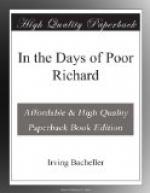“If I hadn’t ‘a’ had purty good control o’ my legs, I guess they’d ‘a’ run erway with me. I had to put the whip on ’em to git ’em to step in under that wagon roof—you hear to me.”
While Solomon was engaged with this trying duty, Lockwood had led the horses out of the stable below and rescued the harness. A heavy shower was falling. The flames had burst through the roof and in spite of the rain, the structure was soon destroyed.
“The wind was favorable and we all stood watching the fire, safe but helpless to do anything for our host,” Jack wrote in a letter. “Fortunately there was another house near and I took the horses to its barn for the night. We slept in a woodshed close to the wagons. We slipped out of trouble by being on hand when it started. If we had gone into the house for supper, I’m inclined to think that the British would not have been driven out of Boston.
“We passed many companies of marching riflemen. In front of one of these, the fife and drum corps playing behind him, was a young Tory, who had insulted the company, and was, therefore, made to carry a gray goose in his arms with this maxim of Poor Richard on his back: ’Not every goose has feathers on him.’
“On the twentieth we reported to General Washington in Cambridge. This was the first time I saw him in the uniform of a general. He wore a blue coat with buff facings and buff underdress, a small sword, rich epaulets, a black cockade in his three-cornered hat, and a blue sash under his coat. His hair was done up in a queue. He was in boots and spurs. He received us politely, directing a young officer to go with us to the powder house. There we saw a large number of barrels.
“‘All full of sand,’ the officer whispered. ’We keep ’em here to fool the enemy,’
“Not far from the powder house I overheard this little dialogue between a captain and a private.
“‘Bill, go get a pail o’ water,’ said the captain.
“’I shan’t do it. ‘Tain’t my turn,’ the private answered.”
The men and officers were under many kinds of shelter in the big camp. There were tents and marquees and rude structures built of boards and roughly hewn timber, and of stone and turf and brick and brush. Some had doors and windows wrought out of withes knit together in the fashion of a basket. There were handsome young men whose thighs had never felt the touch of steel; elderly men in faded, moth-eaten uniforms and wigs.
In their possession were rifles and muskets of varying size, age and caliber. Some of them had helped to make the thunders of Naseby and Marston Moor. There were old sabers which had touched the ground when the hosts of Cromwell had knelt in prayer.
Certain of the men were swapping clothes. No uniforms had been provided for this singular assemblage of patriots all eager for service. Sergeants wore a strip of red on the right shoulder; corporals a strip of green. Field officers mounted a red cockade; captains flaunted a like signal in yellow. Generals wore a pink ribband and aides a green one.




